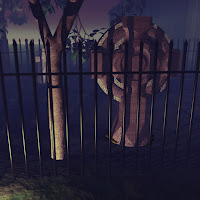The night of 31st October, leading into 1st November, was once the celebration of the new year in this country. The celebration of Samhain (Pronounced 'Sowain') was a chance to rail against the darkness; to face off against our demons and ridicule evil; to light fires that blazed into the cold winter's night. When winter meant a reasonable chance of death due to starvation, freezing temperatures and sickness, the need to declare your defiance against the dying of the year was no small matter.
When Christians took over the festival and renamed it All Hallows Eve, the eve of All Saints Day, the connection with our desire to shine the light into the darkness, to think of death, resurrection and the casting out of evil was obvious; the parallels with the theology of baptism are easy to see. It also links with the concept of Sabbath and Jubilee in the old testament, Jubilee is like a Sabbath of Sabbaths where all debts are forgiven and debtors are given amnesty. On All Hallows Eve all of the darkness and evil could be brought out into the light and cleared away before the coming of the new year.
Today it is true that the festival has become over commercialised and few people celebrate it as either the ancient festival of Samhain or as the Christian festival of All Hallows Eve. There are questions about whether children should knock on strangers doors, and there are questions about how much sugar small people can reasonably contain without exploding, these are reasonable questions. But the failure of Halloween is not the fault of ordinary folk becoming beguiled by the ways of the Devil; it is not a day when the Devil runs around stealing the souls of our otherwise perfect children. The fault of the failure of Halloween lies firmly with us, the Church.
Centuries ago the Church saw and took this wonderful opportunity to show a seamless link between the indigenous way of life in this country, and the new incoming faith. Like Paul in Acts 17, Christians saw that the people of this nation were very religious, and they put a name to the unknown God. But many centuries later we became petty and pious like the Pharisees that Jesus constantly argued with, we forgot how we got to where we were and started complaining about the very advances that we had made. So we abandoned and demonised Halloween, and left it to others to decide what it would be, so that we could stand from a distance and pass judgement. And now we even have alternative 'light parties' as if we've suddenly thought about something new.
Samhain, was a Druidic fire festival and has always been a festival about shining light into the darkness. I have heard people complaining that Halloween celebrates witchcraft. The irony is that Halloween would never have had any connection to witchcraft if Christians hadn't considered it to be one of the evils that needed to be cast out on all Hallows Eve. Christians ought to be more worried when people dress as Bishops or the Pope on Halloween.
Halloween is, as it always was, an opportunity for Christians to engage on a level playing field with the spirituality of the people we meet. We need to stop complaining and get involved in the conversation, to light our own fires against the darkness, to declare the dying of the old life and the resurrection of the new life in Christ, to rail against the darkness, not against the people God has called us to serve.
There is so much genuine evil in the world, why do we Christians spend so much time and effort trying to look for extra evil that isn't there? Is it because after all this time we still prefer the darkness?
